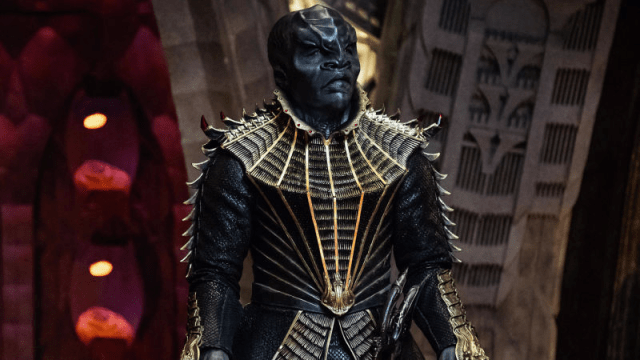Image: CBS All Access
At the Star Trek: Discovery panel at New York Comic Con, a fan in the audience asked about the look of the Klingons, which the person asking the question described as being the most “African” they have ever looked. And to make them the villains can feel alienating.
Executive producer Alex Kurtzman said he wanted to address the Klingons, speaking for a long time. “At the heart of Star Trek is the idea that what we think of the other is a mirror to ourselves,” he started. The core of Kirtzman’s argument was that the Klingons will be shown in a multidimensional way and would not simply be othered or villains. It was important, he said, that “we represented both sides of the war in a way that is understandable and relatable.”
“We needed to know what it was like for them to go through this too,” he continued. “We wanted to shift everyone’s perspective of what the Klingons are because they have often been relegated to just being the bad guy.” He added that the show would show lots of Klingons, that “were all created around the central premise of what Klingons are.” But the goal was to “for lack of a better word, humanize them.” To explain what they want and why they want it. If they didn’t explore this, Kurtzman said, “This wouldn’t be Star Trek.”
Of course the fallacy to Kurtzman’s argument is that the Klingons have been developed a lot more over the course of the 50 years they have existed. By the end of Deep Space Nine, they’d become allies, with a culture that fans knew a lot about. Worf and B’Elanna Torres on Voyager both did a lot of work, as characters, to illuminate different things about that culture.
And the problem Discovery faces is that a) it’s a prequel, so all this stuff they’re adding to the Klingons has to be explained in the context of the work the other shows will do, and the original series had much suaver, but much flatter, versions of Klingons b) the look of these Klingons is othering, it does play into stereotypes of savages that specifically plays as a contrast to white and western aesthetics c) even though the show takes place before the original series, it’s airing after and it feels like we’ve gone backwards with the Klingons.
Look, charitably, Discovery could be adding depth to rewatches of Star Trek: The Original Series, which only takes place ten years later. That could be what Kurtzman meant. But to say that this is breaking ground with the Klingons feels very disingenuous.
